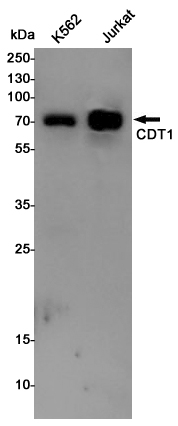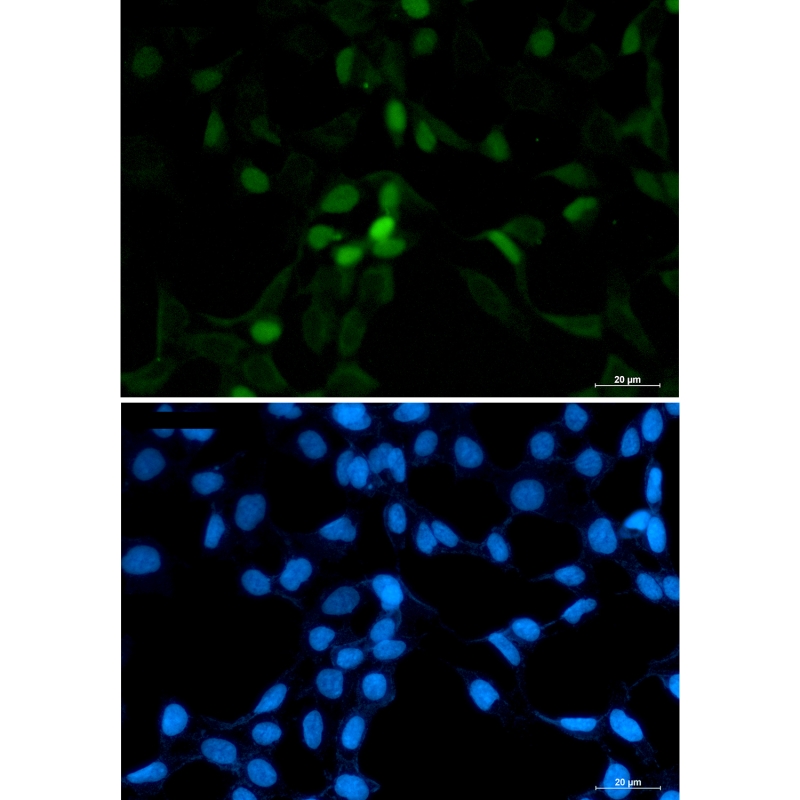

| WB | 咨询技术 | Human,Mouse,Rat |
| IF | 1/20 | Human,Mouse,Rat |
| IHC | 咨询技术 | Human,Mouse,Rat |
| ICC | 1/50-1/200 | Human,Mouse,Rat |
| FCM | 1/50-1/100 | Human,Mouse,Rat |
| Elisa | 咨询技术 | Human,Mouse,Rat |
| Aliases | CDT 1; Chromatin licensing and DNA replication factor 1; Retroviral integration site 2; RIS2 |
| Entrez GeneID | 81620 |
| WB Predicted band size | Calculated MW: 60 kDa; Observed MW: 65 kDa |
| Host/Isotype | Rabbit IgG |
| Antibody Type | Primary antibody |
| Storage | Store at 4°C short term. Aliquot and store at -20°C long term. Avoid freeze/thaw cycles. |
| Species Reactivity | Human |
| Immunogen | Recombinant protein of human CDT1 |
| Formulation | Purified antibody in TBS with 0.05% sodium azide,0.05%BSA and 50% glycerol. |
+ +
以下是关于CDT1抗体的3篇参考文献及其摘要概括:
1. **文献名称**:*"CDT1 is a target of the CRL4Cdt2 ubiquitin ligase in S phase and during DNA damage"*
**作者**:Ralph et al.
**摘要**:该研究利用CDT1特异性抗体,通过Western blot和免疫荧光技术,揭示了CRL4Cdt2复合物在S期和DNA损伤后介导CDT1降解的机制,强调了CDT1在复制许可调控中的关键作用。
2. **文献名称**:*"Overexpression of CDT1 in hepatocellular carcinoma and its clinical significance"*
**作者**:Li et al.
**摘要**:通过免疫组化(使用抗CDT1抗体)分析肝癌组织样本,发现CDT1在肿瘤中显著过表达,并与患者生存率低和肿瘤侵袭性相关,提示其作为肝癌预后标志物的潜力。
3. **文献名称**:*"Cell cycle-dependent oscillation of CDT1 protein levels is essential for preventing re-replication"*
**作者**:Nishitani et al.
**摘要**:研究采用抗CDT1抗体进行细胞周期同步实验,证明CDT1蛋白水平在G1期积累并在S期降解,其周期性调控是防止DNA重复复制的关键机制。
---
以上文献均通过CDT1抗体在实验(如Western blot、免疫组化)中验证了蛋白表达或定位,涉及癌症关联、细胞周期调控及降解机制。
The CDT1 (Cdc10-dependent transcript 1) antibody is a crucial tool for studying DNA replication licensing and cell cycle regulation. CDT1 is a key component of the pre-replicative complex (pre-RC), essential for initiating DNA replication during the G1 phase. It collaborates with CDC6 and the origin recognition complex (ORC) to load the minichromosome maintenance (MCM) helicase onto replication origins, ensuring precise genome duplication. Dysregulation of CDT1. often due to overexpression or impaired degradation, is linked to re-replication, genomic instability, and cancer progression.
CDT1 antibodies are widely used in research to investigate its expression patterns, interactions, and regulatory mechanisms. They enable detection via techniques like Western blotting, immunofluorescence, and chromatin immunoprecipitation (ChIP). Since CDT1 activity is tightly controlled by the CRL4-CDT2 ubiquitin ligase and inhibited by geminin during S phase, these antibodies help elucidate cell cycle checkpoints and replication stress responses. Additionally, they aid in studying pathologies such as cancers, where CDT1 overexpression correlates with poor prognosis, making it a potential therapeutic target. Researchers also employ CDT1 antibodies to explore replication licensing in stem cells, development, and aging processes.
×